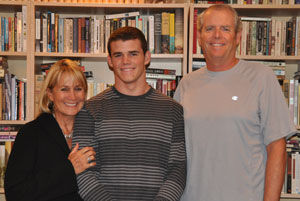Is Empty Nest Syndrome for real?
According to popular wisdom, syndrome sufferers become unhinged when their kids move out. They can't stand the fact that their sons or daughters have sprung the nest to go off to college or get married.
The silence in the house is too intense. They miss their kids desperately--and are confronted with the evidence of their own aging. Despondency sinks in. But an enthusiastic group of Slug parents, whose children headed off to UC Santa Cruz this fall, don't fit that psychological profile.
The truth is more complex. They feel a little unsettled about their children heading out to a four-year university. But they're also feeling excited and optimistic--not to mention gleeful about their children having to do their own laundry.
Paula and Bruce Tomlinson, whose son, Douglas, entered UC Santa Cruz as a freshman this fall, aren't exactly bemoaning their son's departure.
"We started a group here in Los Altos called the Non Grieving Empty Nesters," Paula Tomlinson said with a laugh.
She says that she will certainly miss the energy that Douglas, who plans to study filmmaking, has brought to the family household. "I'm feeling a bunch of conflicting emotions," she said. Then again, she added, "he is going to have to clean up after himself."
Tomlinson concedes that she'd feel much more unsettled if Douglas was heading off to a university far away, such as on the East Coast.
"You know, I'm lucky in the sense that my kid will only be 35 minutes away," Tomlinson said. "It's not like I'm an Empty Nester with a kid on the other side of the continent. I can always phone him up and say, 'Hey, how about lunch?' I can always check in on him to make sure he's alive and well and not fully tattooed."
It also helps that the whole family has already experienced geographical upheavals that are far more dramatic.
Before returning to the United States, the family had moved around to various countries because of Bruce Tomlinson's work; he was a partner at Deloitte & Touche--a giant professional services organization with staff in 140 countries--before changing jobs and becoming the CFO of a commodities company based in Geneva, Switzerland.
Now the question is: What will the parents do next, now that the focus of their energies over the past 18 years will be living and studying in Santa Cruz?
"We are going to pick up where we left off," Paula Tomlinson said. "Now we will devote the rest of our lives to being a couple again."
Other new Slug parents echoed the Tomlinsons' words.
Asked if she was suffering the Empty Nest blues because her daughter, Alexandra, is just about to start classes at UCSC, Mariza Cortez-Cota of Sonora replied: "Are you kidding me?"
For one thing, she has another child in the house--a son in high school. Besides, her predominant feeling is excitement, not separation worries.
"Sure, I'm going through some separation anxiety, but most of all I'm thrilled, because she happens to be the first in her generation to go directly to a four-year university," Cortez-Cota said.
These upbeat reactions are consistent with a widely publicized longitudinal study spearheaded by Sara Gorchoff, a visiting professor at Carleton College who led the study when she was a Ph.D. candidate in psychology at UC Berkeley. Gorchoff also happens to be a UC Santa Cruz alumna herself.
The subjects of the study were first tracked in the late 1950s by Ravenna Helson, who focused on 123 Bay Area women and followed them through marriage, child rearing, and other landmarks.
The long-term study found that overall marital satisfaction increased after their children sprang the nest for various reasons, including going off to college, contrary to popular wisdom.
"There was a big historical trend in research to talk about the empty nest--that you would be bereft, devastated when the kids leave home," Gorchoff said. "There is not a lot of empirical recent evidence supporting that. Even before I did the research I found that the idea of children leaving home being traumatic for mothers isn't well supported, and it has become less and less the case over time."
The empty nest blues were short-lived for Cortez-Cota.
"At first I was melancholy," she said. "I would say to people--but not in front of my daughter--'I'm sad that she's going to leave because my daughter is my right hand.'
But then I went to orientation and saw where she is going to live, and the wonderful friends she has there."
Cortez-Cota was also impressed by her daughter's planned course of study, involving digital media and filmmaking. "Now the joke in my family is, 'I'm not sad because you're leaving. I'm sad because I can't go with you.'"
Cortez-Cota, who works in marketing, sales, and development for a solar-energy company, pursued her education all the way up to her first year at community college, after emigrating with her family from Mexico to the United States.
"And now, here's my daughter, going straight to the university," Cortez-Cota said. "If you go back every generation that has been quite a step up for us. I am overwhelmed with pride."
Terry Taylor of South Pasadena, whose son Lance is heading out to UCSC this week, is facing an empty nest, but she is thrilled to see her son "entering the world of adulthood, and leaving the non-adult years behind."
Taylor concedes that her house is going to be "more quiet than normal because he is not going to be home as often on the weekends. But it's not going to be so shocking because he's already been to boarding school."
Besides, Taylor has no problem with sending her son into the world of adulthood.
"I told him, 'Your parents are no longer responsible for you,'" Taylor said.
When a young person heads off to college, "they have to learn to prioritize," Taylor said. "They can vote. They are legally capable of signing contracts. They can have their first doctor's visits without their parents' knowing."
But Taylor is trying to strike a balance with Lance. While she encourages him to strike out on his own, she wants him to feel comfortable asking her for advice.
"The word 'freedom' has so much meaning," she said. "It can be a joyous thing for them. But at the same time, independence can be frightening. It's a lot for them to deal with at one time. So much is thrown at you almost immediately."
Parents: Is the Empty Nest Syndrome a myth? How did you feel when your son or daughter left for college? Share your thoughts on Facebook.




